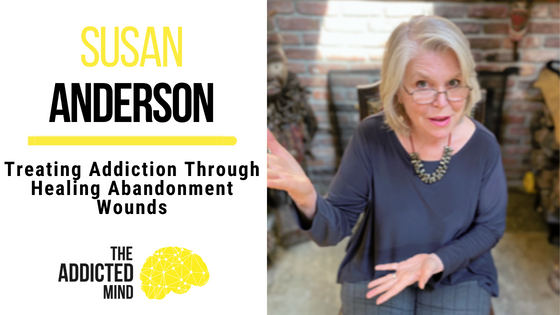The fear of abandonment is universal. The problem is – we try to medicate that feeling with whatever gives us instant gratification (drugs, alcohol, food, television, sleeping, social media, shopping, etc.)
Whatever that looks like, addiction can stem from an unhealed abandonment wound. And when you fail to take care of that wound, it can lead to self-sabotage. So how do we heal our abandonment issues?
On today’s episode, Duane speaks with Susan Anderson, founder of Abandonment Recovery, a program that helps people with numerous issues such as heartbreak loss, self-sabotage, addiction, and compulsion. Susan shares her own story of how she got into this work of dealing with abandonment. Susan gives us an illustration of what abandonment looks like, how it impacts our life, and what we can do to overcome it.
Susan points out that overcoming abandonment is a doing process. Therefore, just knowing about it isn’t necessarily going to help you overcome the wound that may be negatively impacting your life. There needs to be action.
In this episode, you will hear:
- Why abandonment is universal
- The correlation between abandonment and addiction
- Loneliness as a huge adult trigger
- Early abandonment vs. normal level of abandonment
- Self-sabotage and the outer child
- Forms of self-sabotage
- The power of visualization
Key Quotes:
[02:36] – “Abandonment translates to separation anxiety, which is something we all share as human beings. It’s universal and we medicate that feeling.”
[04:16] – “We all have a fear of abandonment, and when it’s triggered by an adult experience, it can create a cascade of hormonal processes in the brain. No matter how strong we are, we can all experience a serious emotional crisis if the trigger is big enough in adulthood.”
[05:37] – “Overcoming abandonment is a doing process, not just a feeling process. It’s a recovery. It’s an ongoing process.”
[10:53] – “When we are going through an adult trigger, even if it’s a mild trigger, the thing that we are most vulnerable to is becoming addicted to a substance or to an activity.”
[19:01] – “If you’ve had a lot of abandonment, you have a lot of self-sabotage… and you repeat the thing that’s so familiar.”
[29:16] “You don’t have to make gigantic changes to have your dreams start to line. You need to make enough of a change just to get that door to swing. It’s an amazing thing that small changes make huge differences.”
[34:18] “Everyone’s looking for a magic bullet that’s why addictions are so popular… but they have to enter on a journey of developing a new relationship with themselves and it’s something they have to really work out and take very seriously.”
Subscribe and Review
Have you subscribed to our podcast? We’d love for you to subscribe if you haven’t yet.
We’d love it even more if you could drop a review or 5-star rating over on Apple Podcasts. Simply select “Ratings and Reviews” and “Write a Review” then a quick line with your favorite part of the episode. It only takes a second and it helps spread the word about the podcast.
If you really enjoyed this episode, we’ve created a PDF that has all of the key information for you from the episode. Just fill in your information below to download it.
Supporting Resources:
___________________________________________________________________________
You can support the Addicted Mind Podcast by purchasing through our affiliate links.
Above are affiliate links, this means that if you purchase something, The Addicted Mind Podcast will earn a commission. This commission does not cost you anything. This commission helps offset the cost of running The Addicted Mind Podcast and enables me to continue to create meaningful and helpful content. Thank you for your continued support.

